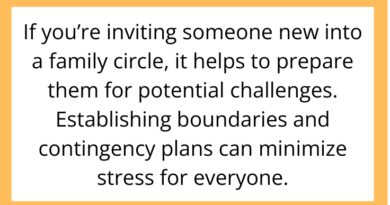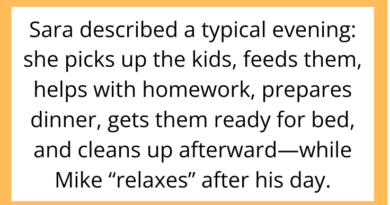AITAH for Not Letting My Mother-in-Law Stay with Us After She Lost Her Apartment?
When it comes to family emergencies, everyone has different expectations. Some believe you should always open your doors, no questions asked. Others draw a line when it comes to protecting their peace and privacy. That’s exactly the dilemma one Reddit user faced when their mother-in-law lost her apartment—and fully assumed she could move in indefinitely.
This AITAH story examines the fine line between compassion and self-preservation and asks: Are you the jerk for refusing to share your home, even when family is in crisis?
The Backstory: A Sudden Loss and an Even Faster Assumption

The Original Poster (OP) explained that their mother-in-law lost her apartment after falling behind on rent. She had been living alone for several years, but her financial situation deteriorated rapidly due to health issues and job instability.
Rather than discussing options, she called OP’s spouse and simply said, “I’ll be bringing my things over tomorrow.” There was no conversation about how long she’d stay, how expenses would be handled, or whether OP felt comfortable with the arrangement.
OP was stunned. They work from home in a small two-bedroom condo and rely on the spare room as an office. Their spouse argued that family always comes first and they couldn’t let her be homeless.
OP offered to help cover a short-term motel or contribute to rent elsewhere but drew the line at having her move in. This led to an explosive fight, and now OP wonders if they were heartless.
The Burden of Assumption: When Helping Turns Into Obligation

Compassion Isn’t a Blank Check
Many commenters pointed out that offering help doesn’t mean surrendering all boundaries. Yes, this was a tough time for the mother-in-law—but that didn’t justify ignoring OP’s consent and circumstances.
OP’s home is also their workspace, and the sudden arrival of a full-time houseguest would directly impact their job, mental health, and marriage.
The idea that family help must be unlimited is a common cultural narrative—but in practice, it can lead to resentment and burnout.
The Lack of Communication
One of the biggest red flags was the assumption itself. Instead of asking, the mother-in-law announced her move as a done deal. That eroded any sense of partnership in the decision.
Several Redditors pointed out that this pattern often spirals into more entitlement: if she moves in without discussion, she may also expect ongoing financial and emotional support without limits.
The Tension Between Spouse and Partner

The Guilt Trip Dynamic
OP’s spouse insisted that “family helps family” and accused OP of caring more about personal space than about people.
But in reality, boundaries aren’t selfish—they’re necessary. OP was willing to contribute financially, which shows empathy without self-sacrifice.
Many people who’ve navigated similar situations shared how ignoring boundaries to avoid conflict only made things worse. One user wrote:
“We let my in-laws move in without an end date. Five years later, they were still in our house, and our marriage nearly collapsed.”
Marriage Means Mutual Agreement
Inviting anyone—especially a struggling relative—into your shared space should be a joint decision. No one partner gets to unilaterally override the other’s needs.
By insisting OP was heartless, the spouse dismissed OP’s right to have a say in their own home and work life.
When Help Turns Into Resentment

The Reality of Indefinite Timelines
OP worried that “a few weeks” could easily become months or years. Without a clear timeline, expectations grow fuzzy, and guilt makes it harder to set limits later.
Some Redditors recommended putting every agreement in writing: how long the stay will last, who pays for utilities, what happens if the arrangement isn’t working.
These safeguards are crucial because without them, the situation can quickly spiral into permanent cohabitation—especially if the mother-in-law struggles to get back on her feet.
Financial Help vs. Physical Space
It’s also important to remember that offering financial assistance is still help. Just because OP wasn’t willing to share their home doesn’t mean they were abandoning family. They were proposing a compromise that respected everyone’s needs.
Reddit’s Verdict: Not the Jerk

The AITAH community overwhelmingly agreed: Not the jerk.
Here are some standout comments:
“You offered financial help. That’s generous. You’re not required to sacrifice your health, work, and marriage.”
“Moving someone in without a conversation is disrespectful, no matter who it is.”
“Boundaries don’t make you cruel. They make you sane.”
This consensus was clear: compassion doesn’t have to mean self-erasure.
Final Thoughts: You’re Not a Villain for Setting Limits

At the end of the day, this story isn’t about whether you love your family—it’s about how you love yourself, too.
Helping relatives in crisis doesn’t have to mean inviting them into your home against your will. You can care deeply and still say, “This doesn’t work for me.”
If your marriage or well-being depends on clear boundaries, don’t let guilt push you past your limit. As one Redditor put it:
“Sometimes the most loving thing you can do is say no.”



